Even in 2025, email marketing is not just alive—it’s thriving. With an average ROI of$36 for every $1 spent, it continues to outperform nearly all other digital channels. In fact, more than 4.5 billion people use email daily, and over 376 billion emails will be sent per day by 2025. For small businesses and new marketers, this means email remains one of the most accessible, reliable, and cost-effective ways to engage with audiences.
Choosing the right platform is where most beginners get stuck. The best email marketing services should offer easy setup, a fair free plan or trial, automation tools, strong templates, and helpful support without overwhelming you. Below, we compare the eight best options—each with its own strengths—so you can decide where to begin.
SendPulse
SendPulse is built for beginners who want easy email marketing today and multichannel growth tomorrow. The interface is straightforward, and you can launch your first campaign quickly with a drag-and-drop builder and responsive templates. As your skills grow, the platform’s Automation 360 and customer data tools help you create smarter, behavior-based journeys without complexity. It’s also one of the few beginner-friendly platforms that natively supports email, SMS, chatbots, and landing pages in one place. If you’re a small business, e-commerce brand, or educator, SendPulse’s balance of usability and depth makes it a top pick for scaling confidently.
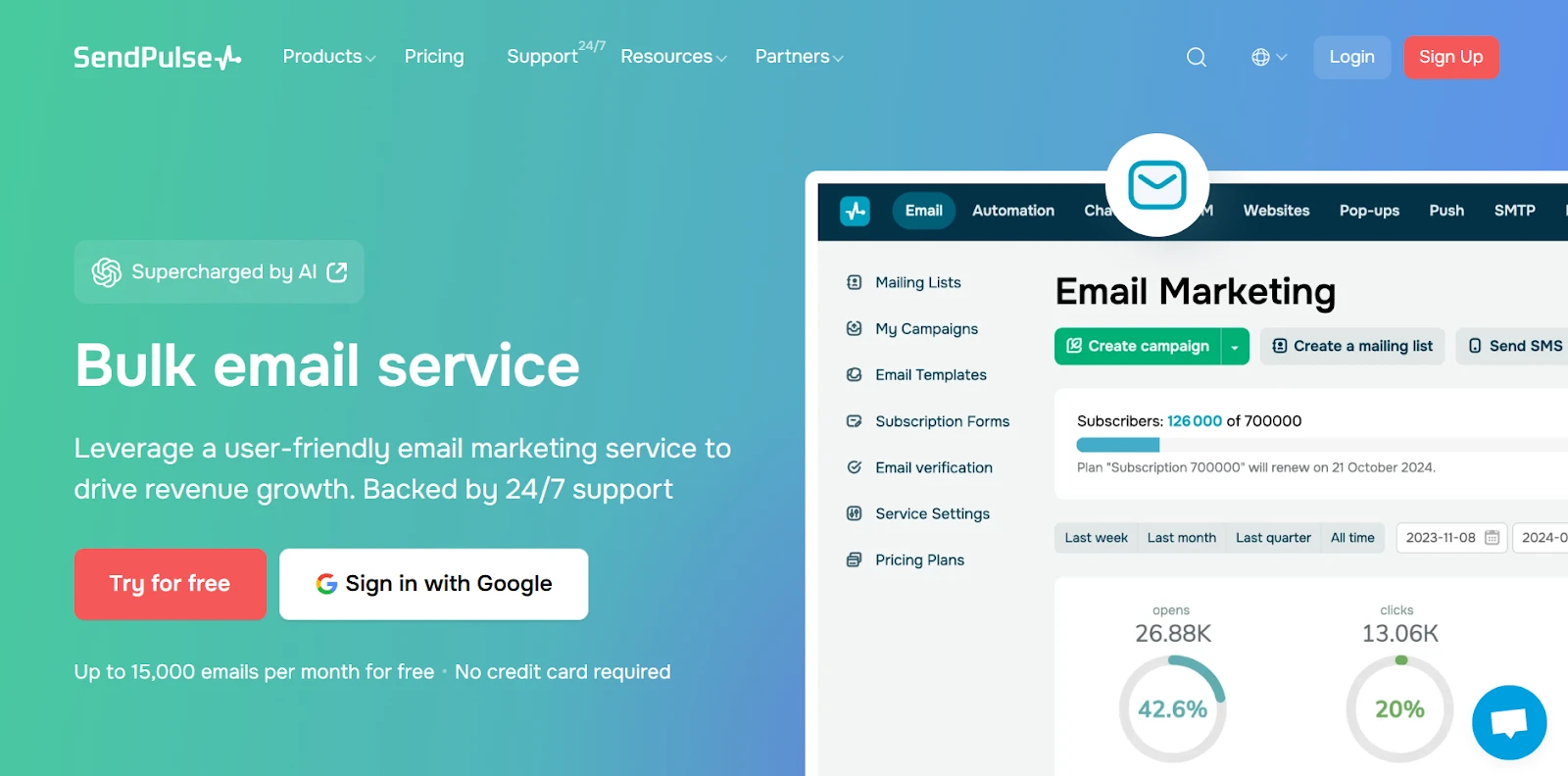
Features & plans:
- Free plan: Up to 500 subscribers and 15,000 emails/month.
- Starting price: ~$8/month at the entry tier; pricing scales by subscriber count and multichannel volume.
- Builder & templates: Drag-and-drop editor plus a large responsive template library.
- Personalization & segmentation: Dynamic and rule-based segments, tags, and conditional content.
- Automation 360: Visual workflows for welcome, abandoned cart, browse abandonment, re-engagement, etc.
- AI usage: AI-assisted subject lines and personalization helpers.
- Deliverability & list quality: Built-in email validator; reputation guidance.
- CDP & multichannel orchestration: 360° profiles across email/SMS/push/chatbot.
- Integrations: Shopify, WooCommerce, WordPress, Zapier, Pipedrive, more.
- Reporting: Dashboards, click maps, conversion metrics.
- Support & learning: 24/7 live chat/phone/email, Help Center, SendPulse Academy.
- Mobile app: Monitor and manage on the go.
Limitations to note: Some UI areas feel dated; certain multichannel/phone support options are on higher tiers (dataset).
Constant Contact
Constant Contact suits nonprofits, local organizations, and small businesses that value a gentle learning curve and event-friendly workflows. The editor is easy to grasp, and the template library speeds up campaign creation. Its event and survey tools stand out if you run workshops, classes, or fundraisers alongside newsletters. While it’s beginner-friendly, some of the deeper automation and segmentation options are more basic than in advanced suites. If you’re building a community and hosting events, Constant Contact offers a friendly path to professional emails.
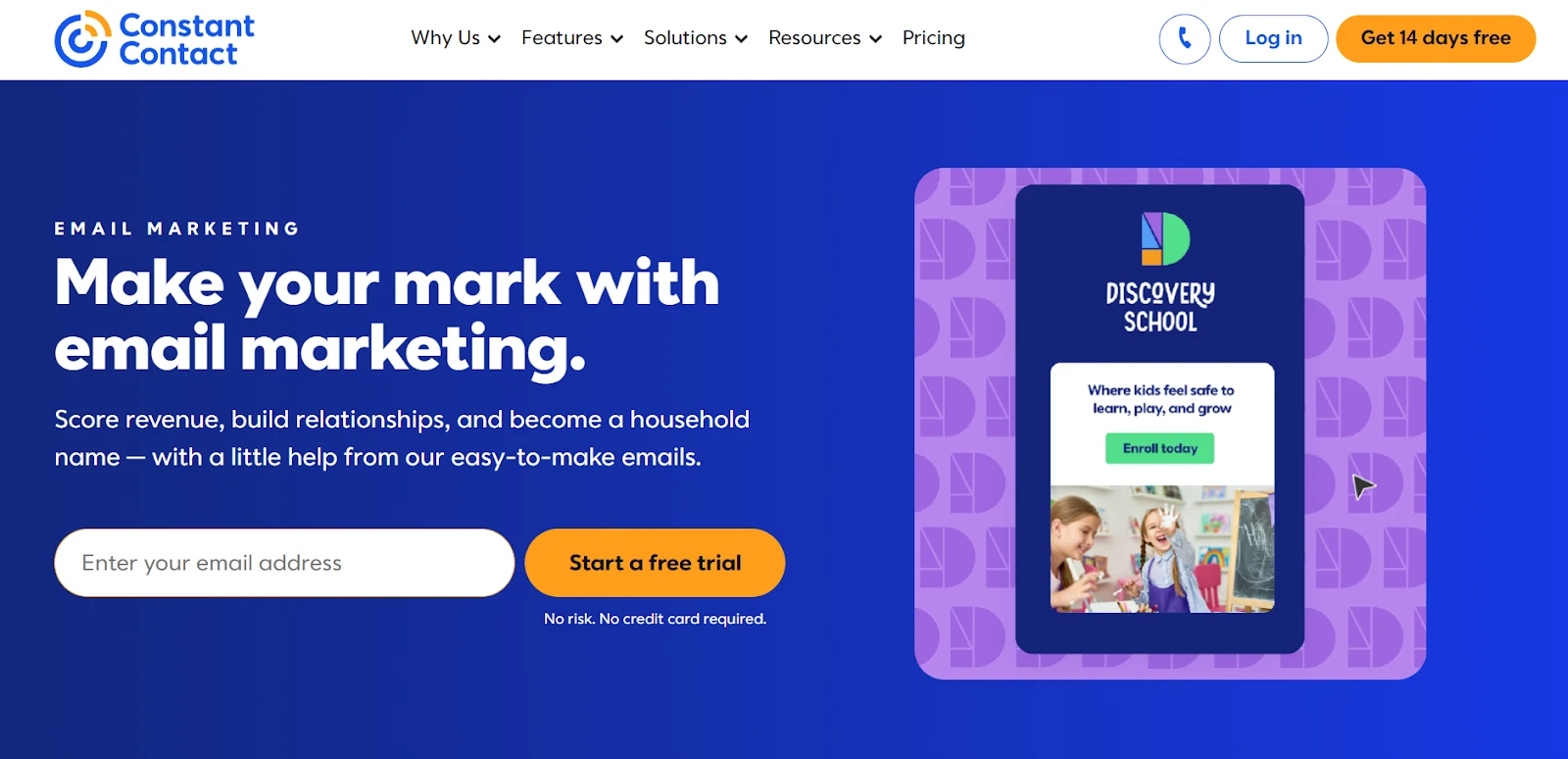
Features & plans:
- Free plan/trial: 14-day free trial; no permanent free tier.
- Paid plans: Start ~$12/month; pricing scales with list size and add-ons; advanced features unlock on higher tiers.
- Builder & templates: Drag-and-drop editor with hundreds of templates.
- Event tools & surveys: RSVP, ticketing, reminders, polls.
- Automation: Basic sequences for welcomes/follow-ups.
- Segmentation: List and behavior filters.
- Integrations: Shopify, WooCommerce, QuickBooks, Eventbrite, WordPress.
- Deliverability & compliance: Established sender reputation and guidance.
- Reporting: Core metrics dashboards.
- Support & learning: Phone, live chat, email, plus tutorials and webinars.
Limitations to note: No forever-free plan; cost can rise with list size; limited advanced automation.
Mailjet
Mailjet is a good pick for teams that collaborate on email design and need developer-friendly options for transactional sends. Its co-editing and approval workflow tools help agencies and cross-functional teams move quickly. The editor is approachable, with A/B testing and personalization for iterative improvements. Technical teams will appreciate robust APIs and documentation to support custom flows. If you’re managing campaigns with multiple stakeholders—or mixing marketing and transactional messages—Mailjet hits a practical sweet spot.
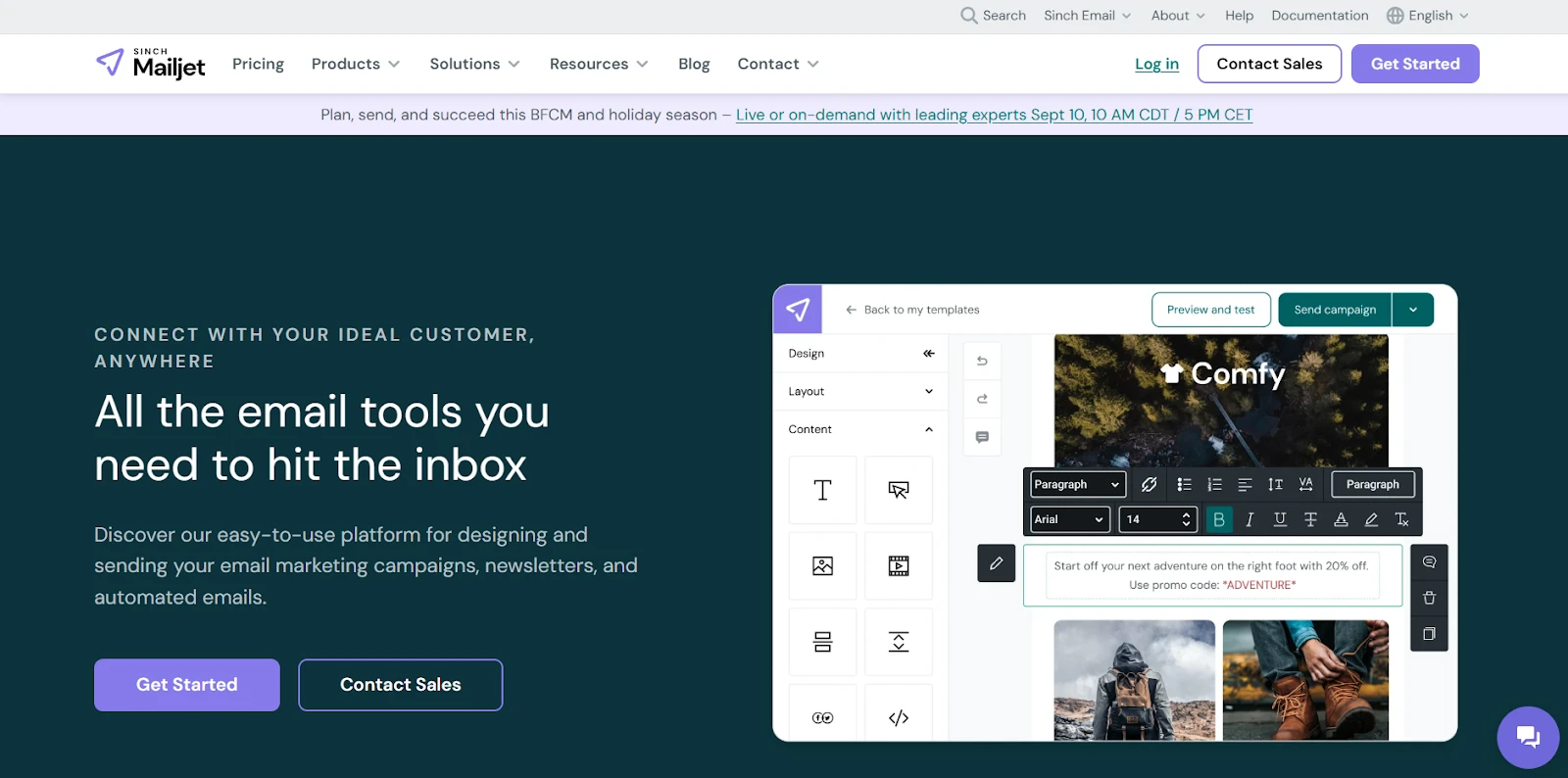
Features & plans:
- Free plan: 6,000 emails/month (max 200/day), unlimited contacts.
- Starting price (paid): ~$17/month (Essential, around 15,000 emails baseline); model scales by email volume (dataset).
- Paid plans: Higher daily/monthly volume, advanced analytics, and premium support on upper tiers.
- Builder & templates: Drag-and-drop builder, A/B testing, reusable blocks.
- Team collaboration: Real-time co-editing, approvals, and permissions.
- Automation: Essential journeys (welcomes, date-based).
- Segmentation & personalization: Contact properties and behavior filters.
- Email validation: Built-in validator.
- API & developer support: Transactional + marketing API, webhooks, SDKs.
- Integrations: Shopify, Salesforce, WordPress, Zapier.
- Deliverability & analytics: Guidance, campaign stats, trends.
- Support: Email on all plans; chat/phone on premium tiers.
Limitations to note: Deeper automation/support gated to higher tiers.
MailerLite
MailerLite focuses on clarity and value, making it popular with bloggers, freelancers, and solopreneurs who want to start fast. The UI is clean, and the builder’s simplicity avoids overwhelm for first-time marketers. Landing pages and websites are built in, so you can capture leads and send campaigns from one place. Automations are practical for welcomes and drip sequences without the complexity of enterprise tools. If minimal fuss at an affordable price is your priority, MailerLite is a great fit.
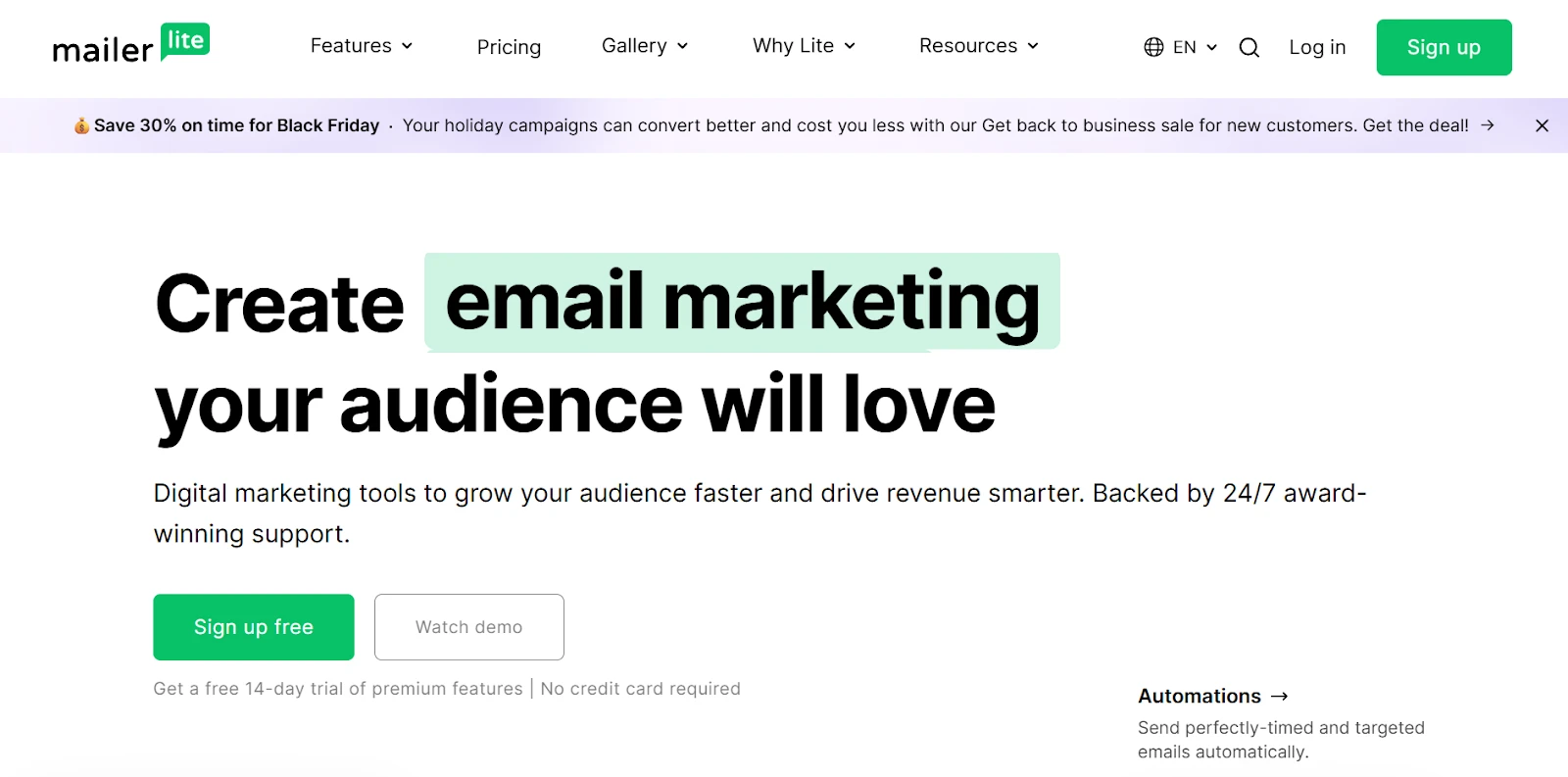
Features & plans:
- Free plan: 1,000 subscribers and 12,000 emails/month.
- Starting price (paid): ~$10/month (Business for 1,000 subscribers); model scales by subscriber count.
- Paid plans: Add unlimited monthly emails, richer automation, and priority support.
- Builder & templates: Drag-and-drop editor, modern templates, brand kits.
- Landing pages & sites: Built-in page builder and pop-ups.
- Automation: Welcomes, simple drip flows, triggers.
- Segmentation: Tags and filters.
- E-commerce & payments: Shopify, WooCommerce, Stripe.
- Integrations: WordPress, Zapier.
- Reporting: Standard engagement metrics.
- Support: 24/7 email support, knowledge base, tutorials.
Limitations to note: Advanced features/integrations on paid tiers.
GetResponse
GetResponse is an all-in-one suite for marketers who want email, webinars, funnels, and landing pages under one roof. The builder and templates are polished, and the funnel-focused approach simplifies lead nurturing. Native webinars are a standout if you run demos, workshops, or online events. Automation and segmentation tools are robust enough to orchestrate complex nurture paths. If you plan to combine list growth + events + email without stitching apps together, GetResponse is compelling.
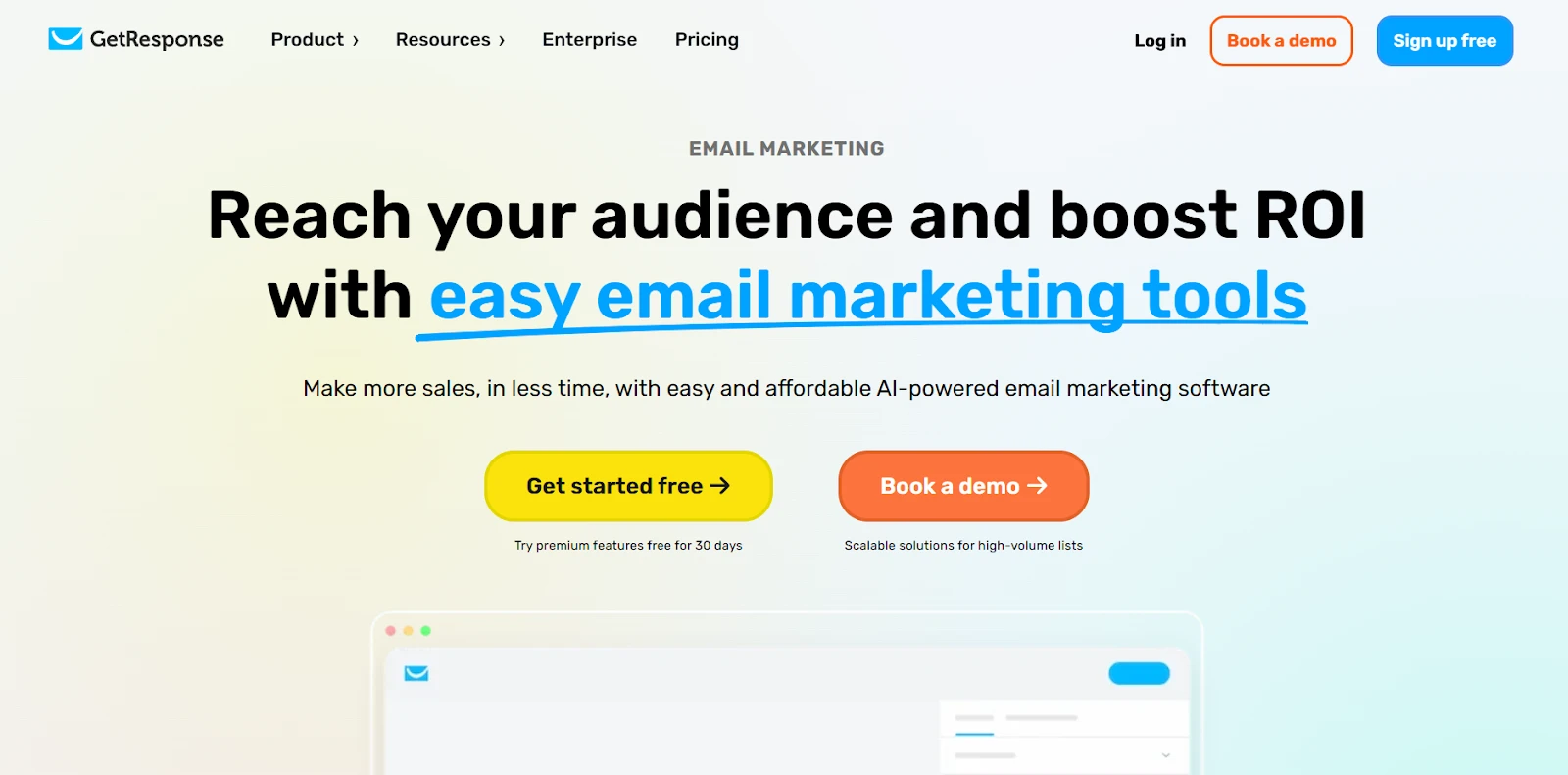
Features & plans:
- Free plan/trial: 30-day free trial.
- Paid plans: Start ~$19/month; higher tiers unlock webinars, funnel features, and advanced automation; price scales with contacts.
- Builder & templates: Drag-and-drop editor, landing pages, funnel templates.
- Webinars & funnels: Host webinars, build conversion funnels.
- Automation: Advanced workflows with behavior/time triggers.
- Segmentation: Detailed filters for interest/behavior/lifecycle.
- Integrations: Shopify, Salesforce, WooCommerce, Google Analytics, Zapier.
- Reporting: Conversion-oriented analytics and funnel KPIs.
- Support: 24/7 chat/email; phone on higher plans.
Limitations to note: Broad toolset can feel complex; costs rise with scale.
AWeber
AWeber is known for reliability and human support, which is comforting when you’re learning the ropes. The editor is straightforward; templates help you send quickly, even without design skills. Automations handle the basics—welcomes, tags, and simple behavior paths—without being intimidating. Integrations cover popular small-business tools and storefronts. If you value dependable help and a familiar workflow, AWeber is a strong “start here” option.
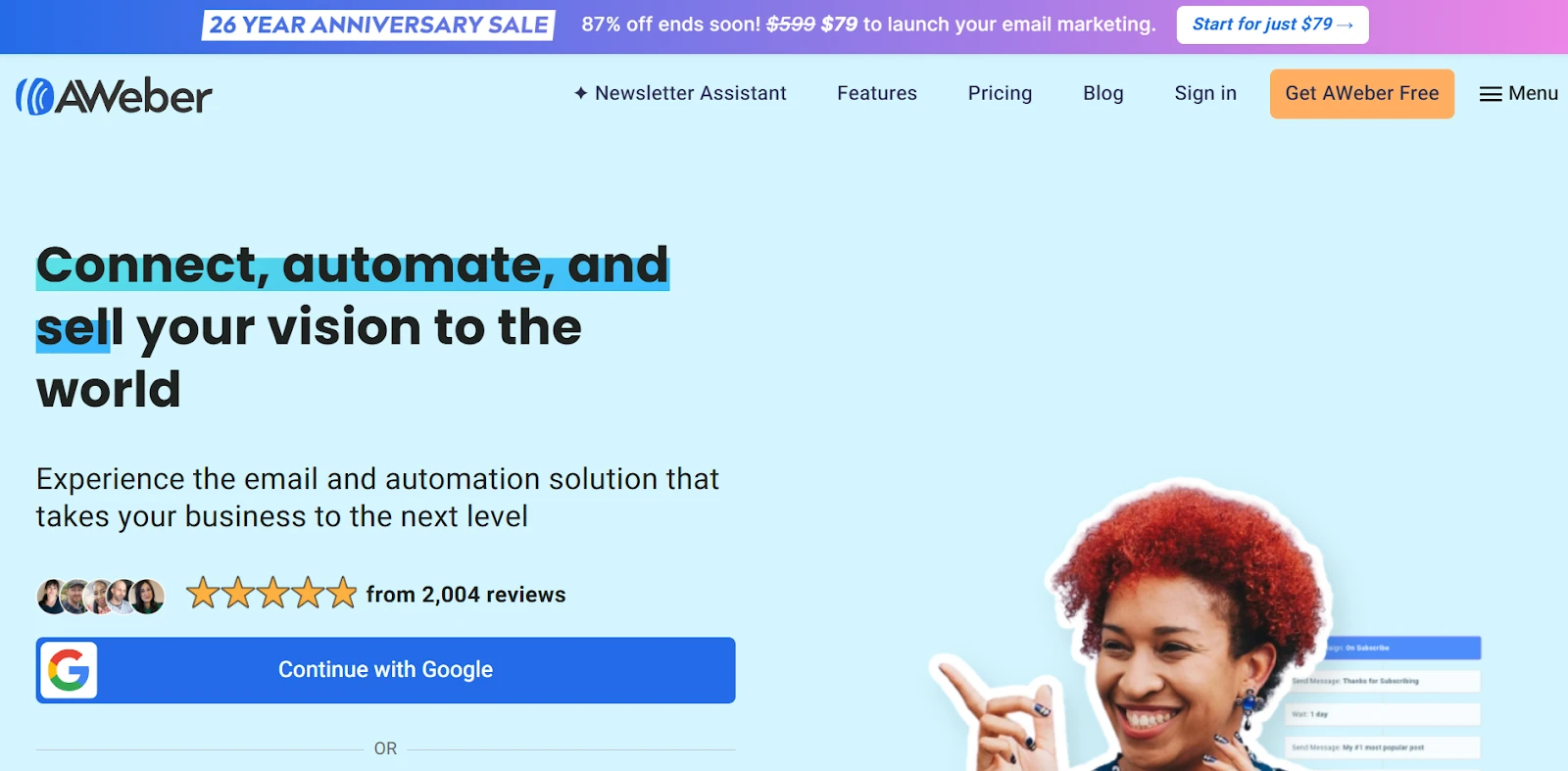
Features & plans:
- Free plan: 500 subscribers and 3,000 emails/month.
- Starting price (paid): ~$15/month (Lite for 500 subscribers); pricing scales by subscriber count.
- Paid plans: Unlock unlimited subscribers, expanded automation, deeper reporting.
- Builder & templates: Drag-and-drop editor and broad template selection.
- Automation & tagging: Straightforward flows with tags and triggers.
- Segmentation: Basic and custom segments.
- Integrations: Shopify, WordPress, Etsy, PayPal, Zapier, Facebook.
- Deliverability & sender reputation: Established infrastructure.
- Reporting: Standard engagement metrics.
- Support: 24/7 phone, chat, email; knowledge base and webinars.
Limitations to note: Less advanced vs. mid-market tools.
Campaigner
Campaigner targets mid-size businesses and agencies that need advanced automation and granular segmentation. The interface is more utilitarian than slick, but it’s built for power users. You can orchestrate complex behavior-based journeys across large lists and dig into fine-grained reporting. Teams with multi-brand or multi-store operations often appreciate its depth. If your strategy demands sophisticated targeting from day one, Campaigner fits the brief.
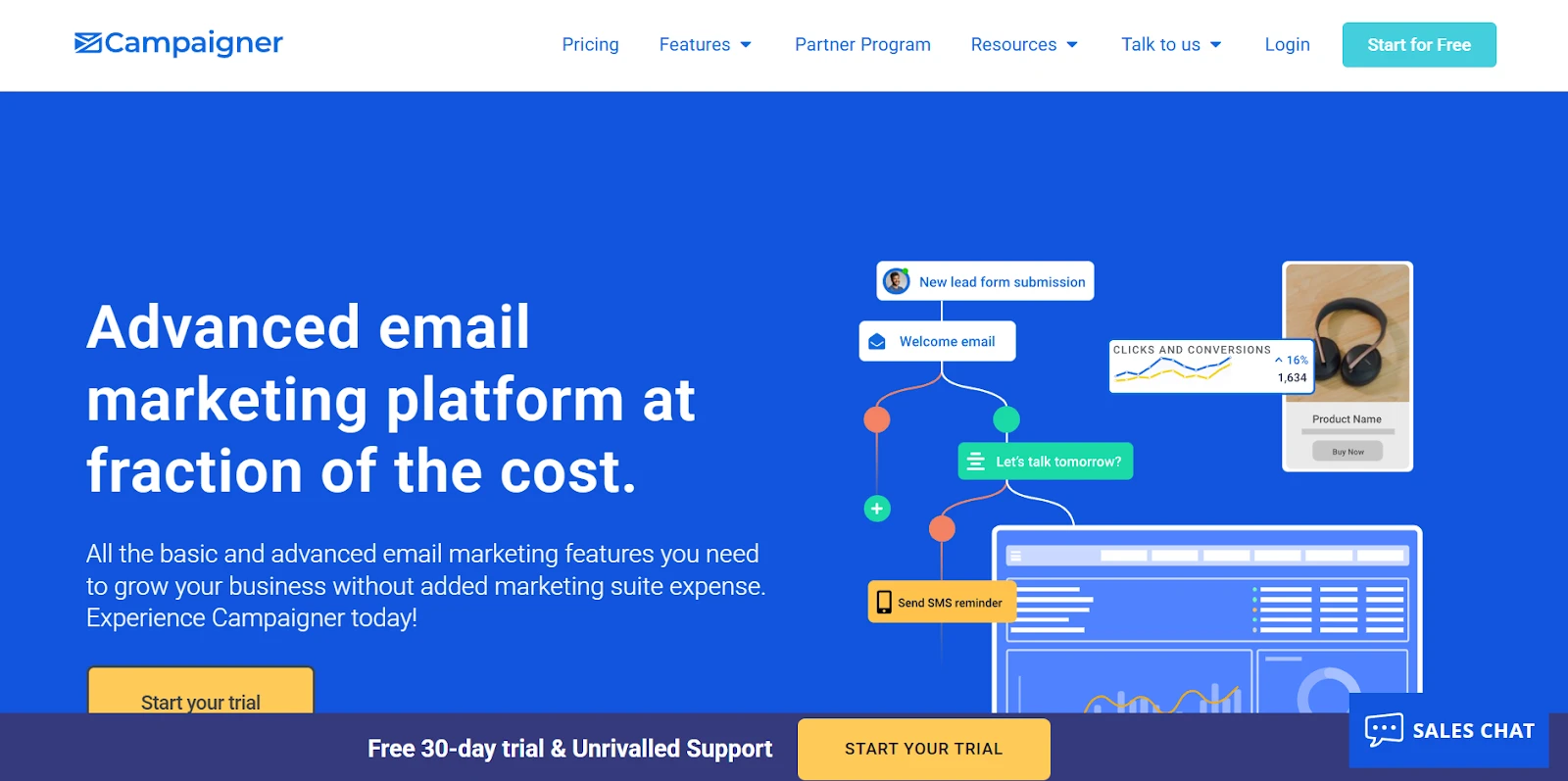
Features & plans:
- Free plan/trial: 30-day free trial.
- Paid plans: Start ~$59/month; pricing scales with features/contacts; advanced automations on higher tiers.
- Automation: Advanced triggers, date-based flows, multi-step logic.
- Segmentation: Highly detailed audience targeting.
- A/B testing: Content and timing experiments.
- Integrations: Shopify, Magento, Salesforce, WordPress.
- Deliverability: Reputation controls and guidance.
- Reporting: Deep analytics and cohort/detail views.
- Permissions & roles: Controls for teams and approvals.
- Support: Phone, email, live chat; account management on premium.
Limitations to note: UI less modern; higher starting price.
Benchmark Email
Benchmark Email emphasizes visual polish and simplicity, ideal for small teams that value design and quick production. Templates look modern out of the box, and the editor is easy for first-timers. You get core automation for welcomes and simple sequences, plus handy image-editing tools. Integrations cover popular e-commerce and analytics platforms. If you want attractive emails fast—minus a steep learning curve—Benchmark is an easy win.
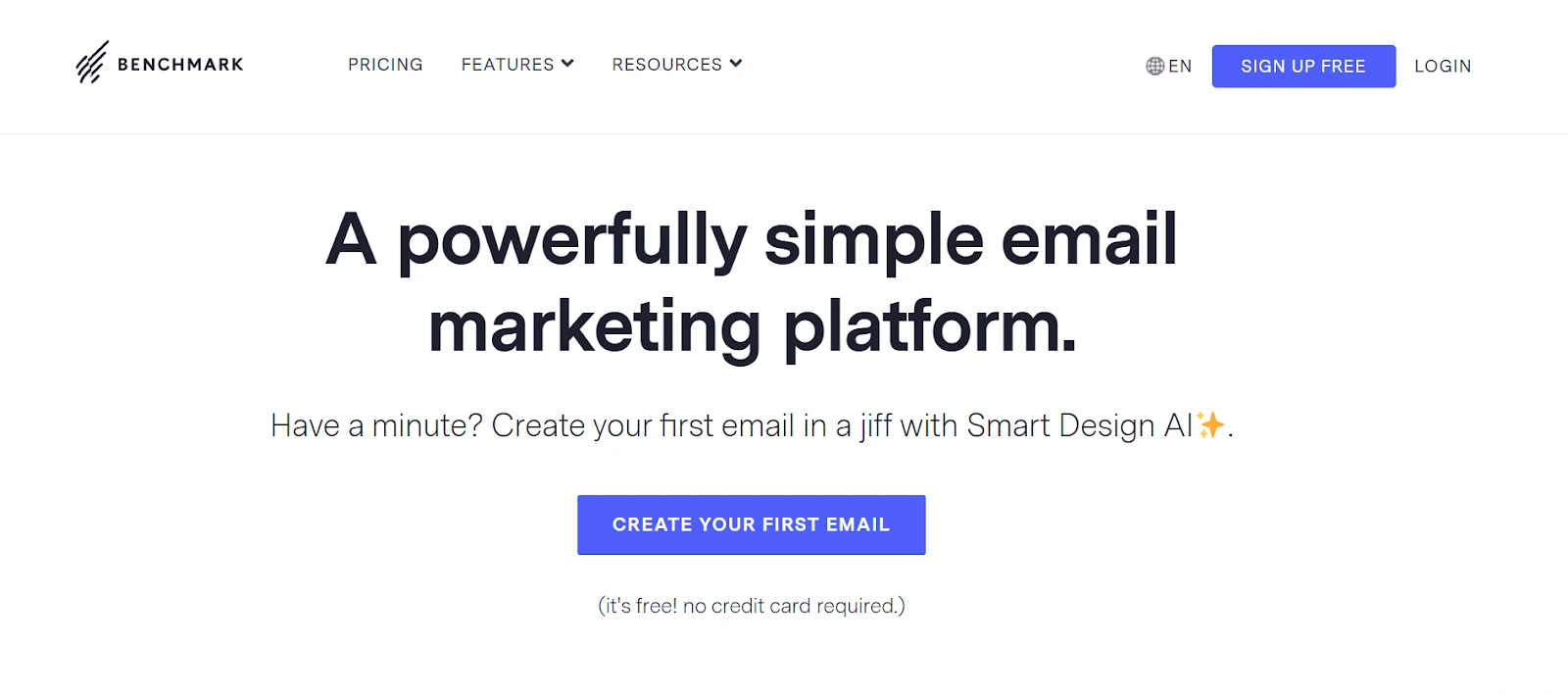
Features & plans:
- Free plan: 500 contacts and 3,500 emails/month.
- Starting price (paid): ~$15/month (for 500 contacts); pricing scales by contacts/email volume.
- Paid plans: Add unlimited contacts, richer automation, and more reporting.
- Builder & templates: Drag-and-drop editor, mobile-responsive templates, image tools.
- Automation: Welcomes, autoresponders, simple journeys.
- Segmentation: List and behavior filters.
- A/B testing: Basic tests for subject/content.
- Integrations: Shopify, WooCommerce, Google Analytics, Zapier.
- Deliverability: Best-practice guidance and list hygiene prompts.
- Reporting: Engagement dashboards and trend views.
- Support & learning: 24/7 chat, phone/email options, knowledge base.
Limitations to note: Advanced automation and analytics require paid tiers.
Let’s Sum It Up
Every platform above can credibly kick-start a beginner’s program, but their personalities differ: Constant Contact brings event tools and approachable support; Mailjet enables team collaboration and developer control; MailerLite prioritizes simple, budget-friendly growth; GetResponse bundles webinars and funnels; AWeber offers reliable help with familiar workflows; Campaigner caters to advanced automation; and Benchmark makes design-led sends fast.
If you want one platform that’s beginner-friendly now and multi-channel ready later, SendPulse is the strongest overall choice from this comparison. Its generous free plan, Automation 360, built-in validator, AI helpers, CDP-style customer view, and 24/7 support reduce friction at every step, while SMS, web push, and chatbots add reach when you’re ready. For creators and small businesses that need the best email marketing service without combining several tools, SendPulse offers a balanced, scalable path to growth.
While email marketing remains one of the most effective ways to nurture leads and build customer relationships, it works best when paired with other digital tools. Small businesses, in particular, can benefit from combining email campaigns with social media, automation, and analytics solutions to stay competitive. If you’re looking for additional ways to strengthen your strategy, this guide to the best marketing tools for small businesses offers practical options that can complement your email marketing efforts.


